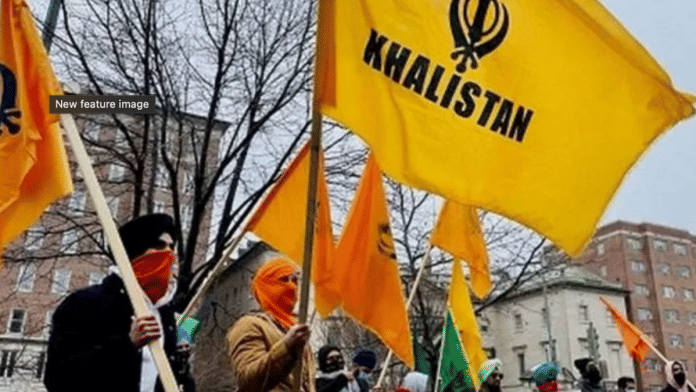New Delhi: Sikh separatists in Canada have been “observed” as receiving financing from the country, including by soliciting donations from the Indian community in the North American nation, a Canadian government report has said.
“Several terrorist entities listed under the Criminal Code in Canada that fall under the PMVE (Political Motivated Violent Extremism) category, such as Hamas, Hezbollah, and the Khalistani violent extremist groups Babbar Khalsa International and the International Sikh Youth Federation, have been observed by law enforcement and intelligence agencies to receive financial support originating from Canada,” read the 2025 Assessment of Money Laundering and Terrorist Financing Risks published by the Canadian government last month.
“Khalistani extremist groups supporting violent means to establish an independent state within Punjab, India are suspected of raising funds in a number of countries, including Canada. These groups previously had an extensive fundraising network in Canada but now appear to consist of smaller pockets of individuals with allegiance to the cause but seemingly no particular affiliation to a specific group,” it added.
The assessment of terror financing risks in the North American country found that the “main foreign-based threat actors” active in Canada rely on diverse sources for funding, including cryptocurrencies, crowdfunding, informal value transfer systems (IVTS), state sponsorship, abuse of non-profit organisations (NPOs) and criminal activity.
“The misuse of the charitable and NPO sectors has been observed as a prominent financing method used by Hamas and Hezbollah. Khalistani violent extremist groups have also been known to use networks to solicit donations from diaspora communities to raise and move funds, including through NPOs,” the report further said.
Both the previous threat assessments—2023 and 2015 respectively—available in the archives have sections regarding funding to Sikh separatists groups active in Canada, with focus on Babbar Khalsa and the International Sikh Youth Federation.
The 2015 report, which was published by a Conservative government led by then prime minister Stephen Harper, had labelled the Sikh separatist groups as “Khalistani Extremist Groups”. However, the 2023 report, published during Justin Trudeau’s tenure as prime minister, had removed the word “Khalistani”, and had all information regarding the activities of Sikh separatist groups under the heading “extremist groups supporting violent means to establish a state within India”.
The heading used by the Trudeau administration had made no mention of Punjab, or the activities of Sikh separatists. However, the latest report under Prime Minister Mark Carney’s administration has been more explicit in the terminology, going back to the 2015 formula of “Khalistani Extremist Groups”.
Carney’s government has significantly differed from Trudeau’s with regards to Sikh separatism—a major irritant in ties between New Delhi and Ottawa. In June 2025, the annual report of the Canadian intelligence service had explicitly mentioned that the “primary” politically motivated violent extremism threat manifested in Canada since the 1980s is Sikh separatism.
The June report was published a day after Prime Minister Narendra Modi had met Carney on the margins of the G7 summit in Alberta, Canada. Ties between the two countries have started to stabilise in recent months following Trudeau’s exit earlier this year.
Last week, both countries simultaneously announced the appointment of High Commissioners to their respective missions in New Delhi and Ottawa after a break of almost 10 months. Diplomatic ties had cratered in September 2023 after Trudeau had announced that Ottawa was investigating “credible allegations” linking Indian officials to the killing of Hardeep Singh Nijjar.
Nijjar, an Indian-designated terrorist, was gunned down outside a gurdwara in Surrey, British Columbia in June 2023. India had rejected Trudeau’s claims, calling them “absurd and motivated”. Eventually by October 2023, the Canadian mission in India was asked to remove 41 diplomats and their dependents as New Delhi called for “diplomatic parity”.
However, in October 2024, ties hit rock bottom following the withdrawal of India’s High Commissioner Sanjay Kumar Verma and five other diplomats from Ottawa after Canada requested the withdrawal of their immunity as a part of the investigations into the killing of Nijjar.
India had refused the request and further expelled six Canadian diplomats, including Acting High Commissioner Stewart Wheeler. However, Trudeau resigned from office in January 2025, and handed over the premiership to Carney in March after the former central banker was selected as the next leader of the Liberal Party.
Carney led the Liberal Party to victory in snap polls in April 2025, and has since taken steps to stabilise ties with India. The invitation extended to Modi to attend the G7 summit had allowed the two leaders to hold bilateral talks and announce concrete steps to rebuild confidence in the relationship.
(Edited by Mannat Chugh)
Also Read: India and Canada appoint new envoys, Dinesh Patnaik will be Delhi’s High Commissioner in Ottawa






